Module 4 Great Scientists Writing 课件(21张PPT)
文档属性
| 名称 | Module 4 Great Scientists Writing 课件(21张PPT) |
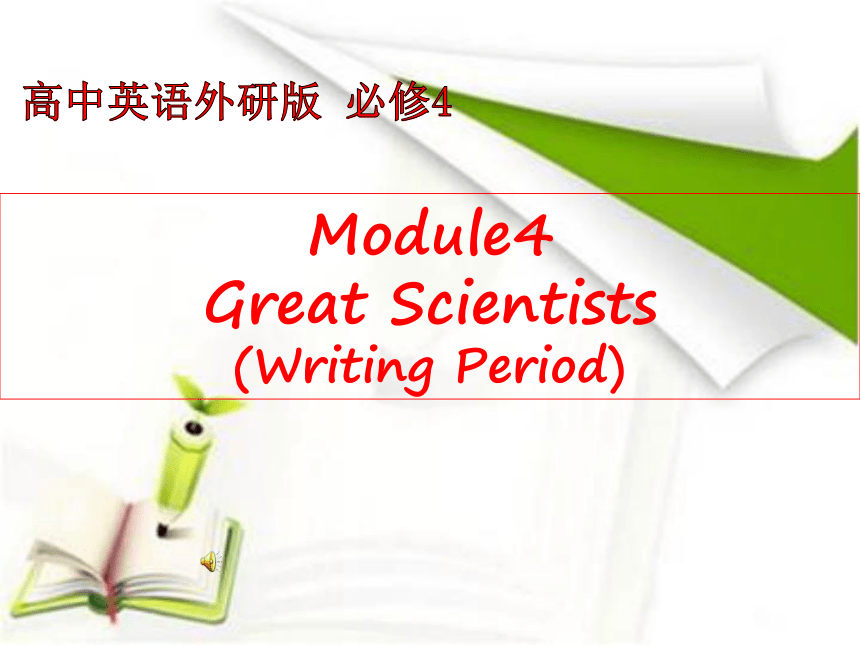
|
|
| 格式 | zip | ||
| 文件大小 | 957.2KB | ||
| 资源类型 | 教案 | ||
| 版本资源 | 外研版 | ||
| 科目 | 英语 | ||
| 更新时间 | 2019-08-19 22:10:49 | ||
图片预览

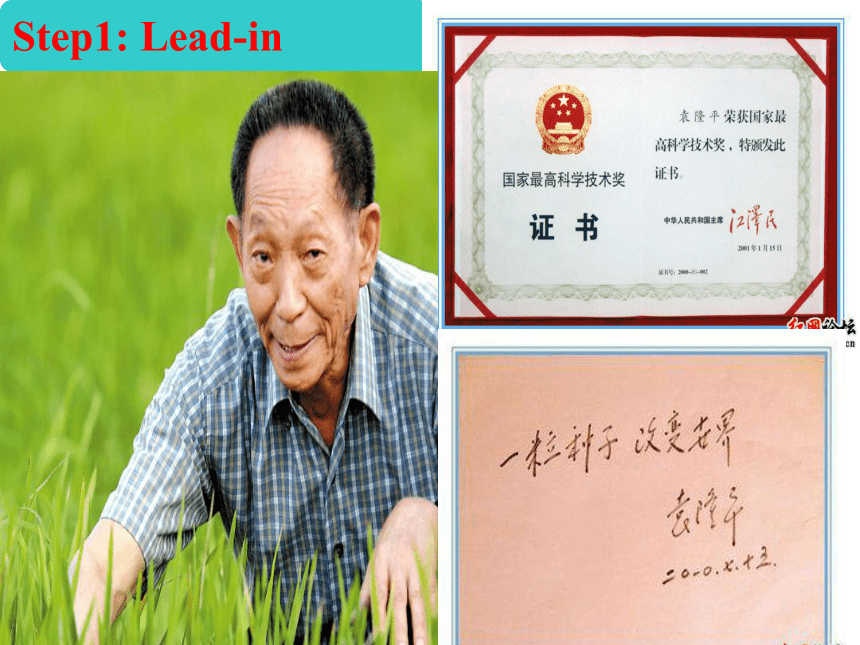
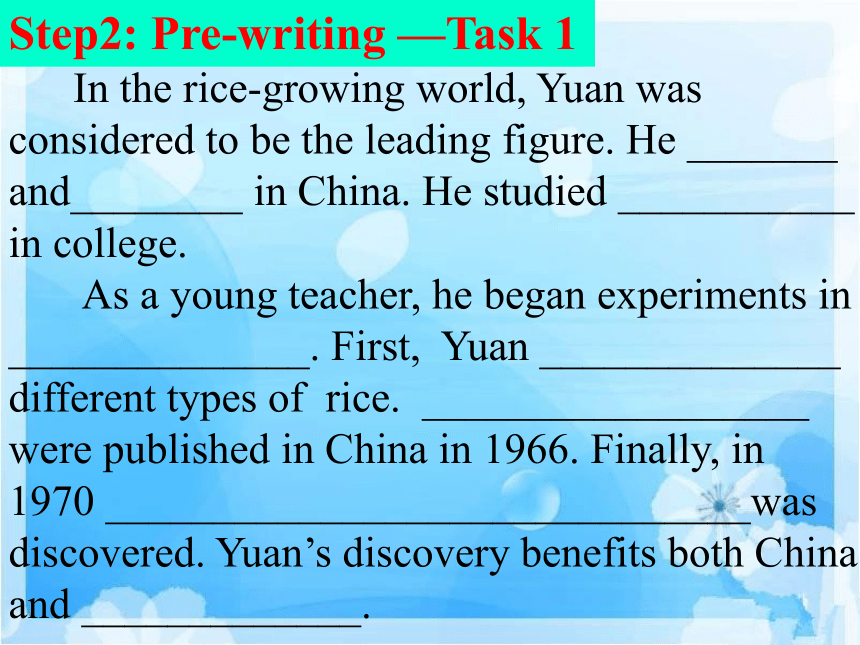

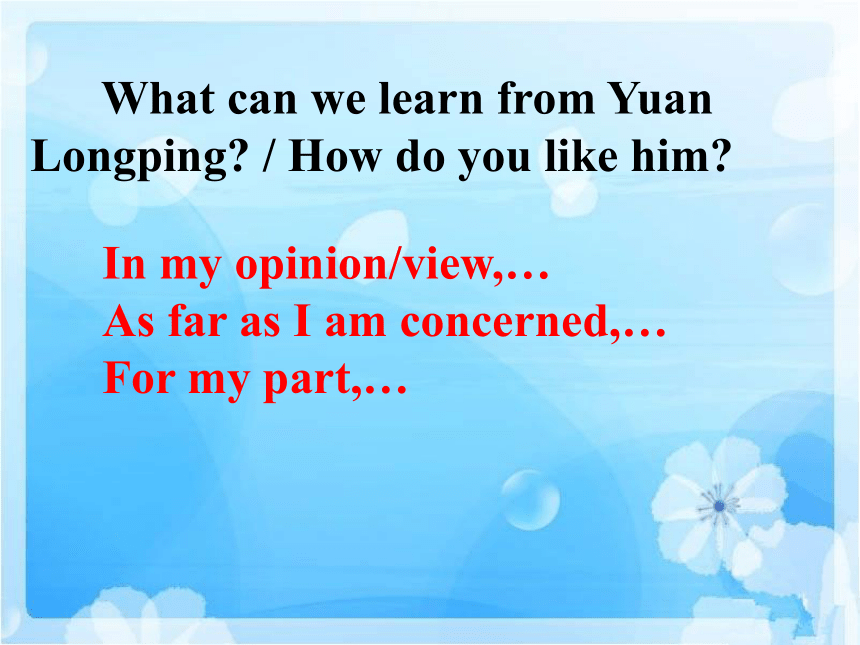
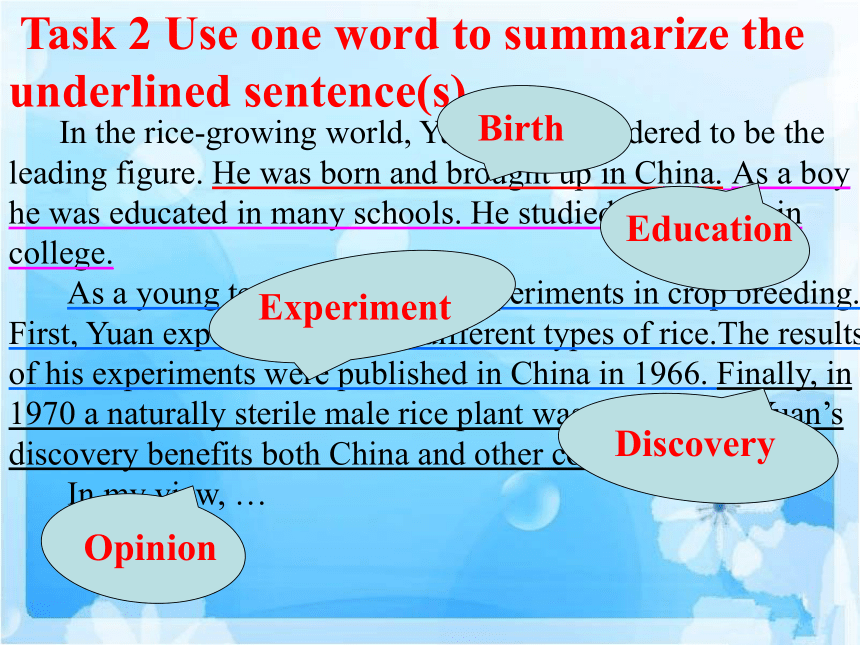
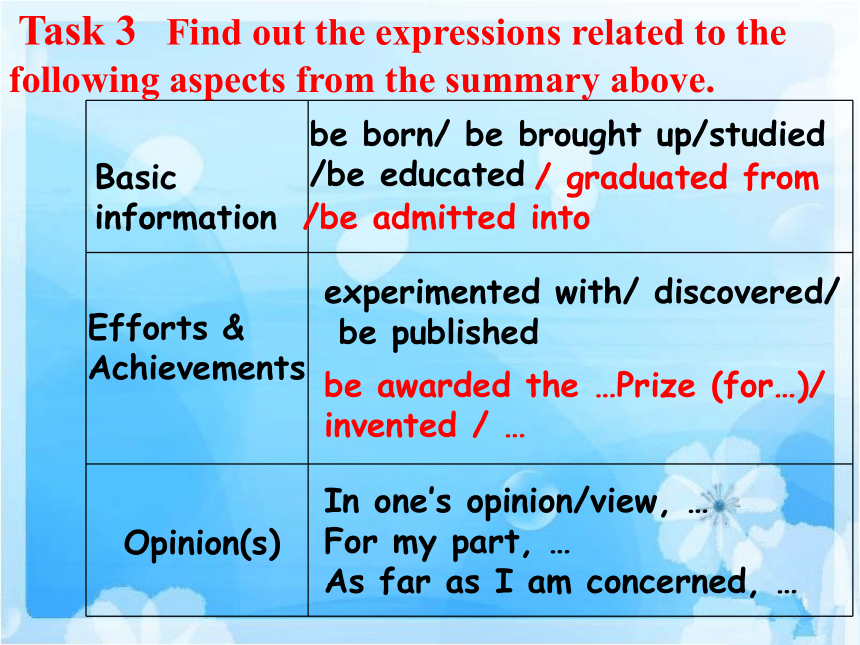

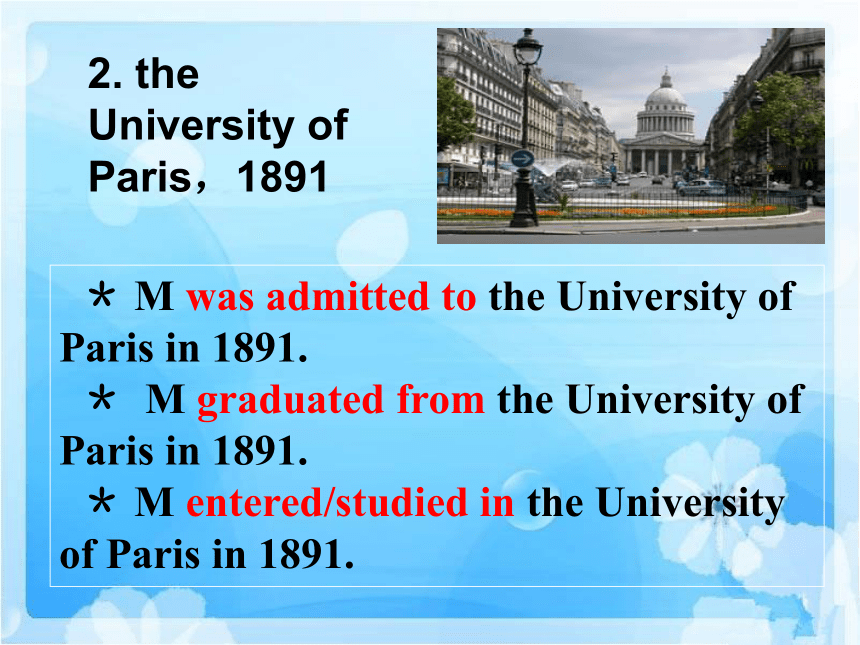
文档简介
课件21张PPT。Module4
Great Scientists
(Writing Period)高中英语外研版 必修4 Step1: Lead-inStep2: Pre-writing —Task 1 In the rice-growing world, Yuan was considered to be the leading figure. He _______ and________ in China. He studied ___________ in college.
As a young teacher, he began experiments in ______________. First, Yuan ______________ different types of rice. __________________ were published in China in 1966. Finally, in 1970 ______________________________was discovered. Yuan’s discovery benefits both China and _____________. In the rice-growing world, Yuan was considered to be the leading figure. He _______ and_________ in China. He studied __________ in college.
As a young teacher, he began experiments in ______________. First, Yuan ______________ different types of rice. __________________ were published in China in 1966. Finally, in 1970 _______________________________was discovered. Yuan’s discovery benefits both China and _____________.brought upwas bornagriculturecrop breedingexperimented withThe results of his experimentsa naturally sterile male rice plantother countriesStep2: Pre-writing —Task 1 What can we learn from Yuan Longping? / How do you like him?In my opinion/view,…
As far as I am concerned,…
For my part,… In the rice-growing world, Yuan was considered to be the leading figure. He was born and brought up in China. As a boy he was educated in many schools. He studied agriculture in college.
As a young teacher he began experiments in crop breeding. First, Yuan experimented with different types of rice.The results of his experiments were published in China in 1966. Finally, in 1970 a naturally sterile male rice plant was discovered. Yuan’s discovery benefits both China and other countries.
In my view, … Task 2 Use one word to summarize the underlined sentence(s). Basic informationEfforts & Achievements Opinion(s)be born/ be brought up/studied /be educatedexperimented with/ discovered/
be published In one’s opinion/view, …
For my part, …
As far as I am concerned, … Task 3 Find out the expressions related to the following aspects from the summary above. / graduated from /be admitted intobe awarded the …Prize (for…)/ invented / …Step3: Writing — Task 4 1. Poland, 1867Talk about the great scientist M! * M was born in Poland in 1867.
* M died in Poland in 1867.
* M arrived in Poland in 1867.
* M left Poland in 1867.2. the University of Paris,1891 * M was admitted to the University of Paris in 1891.
* M graduated from the University of Paris in 1891.
* M entered/studied in the University of Paris in 1891. 3. polonium and radium, 1898 * Polonium and radium were discovered by M in 1898.
* M discovered polonium and
radium in 1898.
* M’s book on polonium and
radium was published in 1898. 4. the Nobel Prize for Physics, 1903; the Nobel Prize for Chemistry, 1911 * M was awarded the Nobel Prize for Physics in1903.
* M won/received the 1911 Nobel Prize for Chemistry.
* M was given the Nobel Prize twice. Marie Curie
Marie Curie was known to the world as a physicist and chemist. She was born in 1867 in Poland. When she was 24, she was admitted into the University of Paris.
After graduation, she was devoted to scientific researches. She discovered radium and polonium in 1898, and she was given the 1903 Nobel Prize in Physics for her discovery. Eight years later, she was awarded the Nobel Prize in Chemistry. Unfortunately, she died of a disease caused by radioactive materials at the age of 67.
In my view, she is a brilliant scientist and I respect her for her hard work. Tips on your writing!
While writing, you’d better:cover the three aspects in your article.develop it in the order of time. Topic sentence & summary sentenceTask 5 Write about a famous scientist!Step4: PresentationHomework
Polish your writing about your favorite scientist!Albert Einstein* 1879-1955, Germany
* studied physics in Switzerland, 1896
* the special theory of relativity(狭义相对论),1905
* the general theory of relativity(广义相对论),1915
* the Nobel Prize for physics,1921Stephen Hawking*(1942-2018 ), Oxford
* Oxford University, 1959
* diagnosed with motor neurone disease, the 1960s
* Professor of Physics at Cambridge University, 1977
* A Brief History of Time, 1988* 1809, England
* an English naturalist
* Edinburgh, study medicine,1825
* the voyage of the Beagle, from 1831 to 1836
* The Zoology of the Beagle,1839
* On the Origin of Species,1859Newton* (1642 -1726,England )
* the father of modern science
* Cambridge University, 1661
* professor of mathematics at Cambridge University, 1669
* law of universal gravitation(万有引力定律), 1687
Great Scientists
(Writing Period)高中英语外研版 必修4 Step1: Lead-inStep2: Pre-writing —Task 1 In the rice-growing world, Yuan was considered to be the leading figure. He _______ and________ in China. He studied ___________ in college.
As a young teacher, he began experiments in ______________. First, Yuan ______________ different types of rice. __________________ were published in China in 1966. Finally, in 1970 ______________________________was discovered. Yuan’s discovery benefits both China and _____________. In the rice-growing world, Yuan was considered to be the leading figure. He _______ and_________ in China. He studied __________ in college.
As a young teacher, he began experiments in ______________. First, Yuan ______________ different types of rice. __________________ were published in China in 1966. Finally, in 1970 _______________________________was discovered. Yuan’s discovery benefits both China and _____________.brought upwas bornagriculturecrop breedingexperimented withThe results of his experimentsa naturally sterile male rice plantother countriesStep2: Pre-writing —Task 1 What can we learn from Yuan Longping? / How do you like him?In my opinion/view,…
As far as I am concerned,…
For my part,… In the rice-growing world, Yuan was considered to be the leading figure. He was born and brought up in China. As a boy he was educated in many schools. He studied agriculture in college.
As a young teacher he began experiments in crop breeding. First, Yuan experimented with different types of rice.The results of his experiments were published in China in 1966. Finally, in 1970 a naturally sterile male rice plant was discovered. Yuan’s discovery benefits both China and other countries.
In my view, … Task 2 Use one word to summarize the underlined sentence(s). Basic informationEfforts & Achievements Opinion(s)be born/ be brought up/studied /be educatedexperimented with/ discovered/
be published In one’s opinion/view, …
For my part, …
As far as I am concerned, … Task 3 Find out the expressions related to the following aspects from the summary above. / graduated from /be admitted intobe awarded the …Prize (for…)/ invented / …Step3: Writing — Task 4 1. Poland, 1867Talk about the great scientist M! * M was born in Poland in 1867.
* M died in Poland in 1867.
* M arrived in Poland in 1867.
* M left Poland in 1867.2. the University of Paris,1891 * M was admitted to the University of Paris in 1891.
* M graduated from the University of Paris in 1891.
* M entered/studied in the University of Paris in 1891. 3. polonium and radium, 1898 * Polonium and radium were discovered by M in 1898.
* M discovered polonium and
radium in 1898.
* M’s book on polonium and
radium was published in 1898. 4. the Nobel Prize for Physics, 1903; the Nobel Prize for Chemistry, 1911 * M was awarded the Nobel Prize for Physics in1903.
* M won/received the 1911 Nobel Prize for Chemistry.
* M was given the Nobel Prize twice. Marie Curie
Marie Curie was known to the world as a physicist and chemist. She was born in 1867 in Poland. When she was 24, she was admitted into the University of Paris.
After graduation, she was devoted to scientific researches. She discovered radium and polonium in 1898, and she was given the 1903 Nobel Prize in Physics for her discovery. Eight years later, she was awarded the Nobel Prize in Chemistry. Unfortunately, she died of a disease caused by radioactive materials at the age of 67.
In my view, she is a brilliant scientist and I respect her for her hard work. Tips on your writing!
While writing, you’d better:cover the three aspects in your article.develop it in the order of time. Topic sentence & summary sentenceTask 5 Write about a famous scientist!Step4: PresentationHomework
Polish your writing about your favorite scientist!Albert Einstein* 1879-1955, Germany
* studied physics in Switzerland, 1896
* the special theory of relativity(狭义相对论),1905
* the general theory of relativity(广义相对论),1915
* the Nobel Prize for physics,1921Stephen Hawking*(1942-2018 ), Oxford
* Oxford University, 1959
* diagnosed with motor neurone disease, the 1960s
* Professor of Physics at Cambridge University, 1977
* A Brief History of Time, 1988* 1809, England
* an English naturalist
* Edinburgh, study medicine,1825
* the voyage of the Beagle, from 1831 to 1836
* The Zoology of the Beagle,1839
* On the Origin of Species,1859Newton* (1642 -1726,England )
* the father of modern science
* Cambridge University, 1661
* professor of mathematics at Cambridge University, 1669
* law of universal gravitation(万有引力定律), 1687
